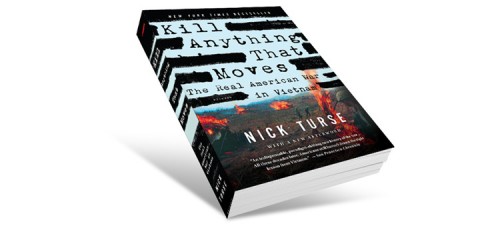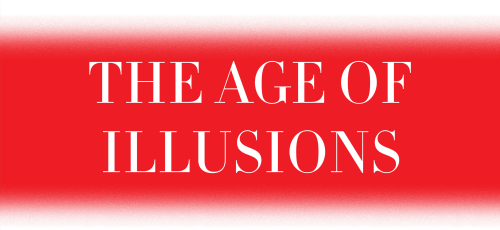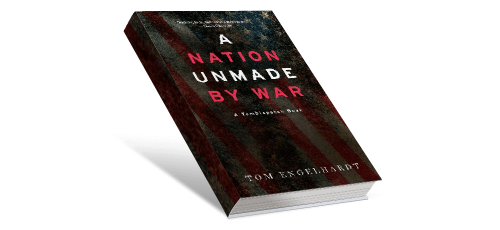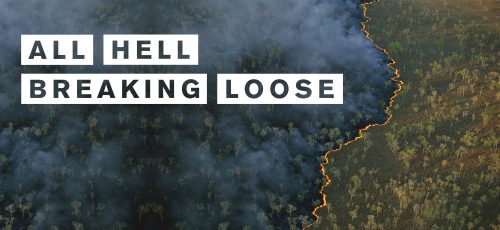The Blog
Recent Posts by American Empire Project Authors and other Influencers

As the World Looks Away, Death Stalks the Democratic Republic of Congo
Nick Turse
GOMA, North Kivu Province, Democratic Republic of Congo — The boy was sitting next to his father, as he so often did. He mimicked his dad in every way. He wanted to be just like him, but Muhindo Maronga Godfroid, then a 31-year-old primary school teacher and farmer, had bigger plans for his two-and-a-half-year-old son. He would go to university one day. He would become a “big name” — not just in their village of Kibirizi, but in North Kivu Province, maybe the entire Democratic Republic of Congo. The boy was exceedingly smart. He was, Godfroid said, “amazing.” He could grow up to be a leader in a country in desperate need of them.
Kahindo Jeonnette was just putting dinner on the table when someone began pounding on the front door. “Open! Open! Open!” a man yelled in Swahili. Jeonnette was startled.
The 24-year-old mother of two looked at her husband. Godfroid shook his head. “I can’t open the door unless you say who you are,” she called out.
“I’m looking for your husband. I’m his friend,” came the response.
“It’s too late now. My husband can’t come out. Come back tomorrow,” she replied.
The man shouted, “Then I’m going to open it!” and pumped several bullets into the door. One tore through Godfroid’s left hand, leaving him with just a thumb and two-and-a-half fingers. For a moment, he was stunned. The pain had yet to hit him and he couldn’t quite piece together what had happened. Then he turned his head and saw his tiny son splayed out on the floor.
The grieving parents can’t even bring themselves to utter their late son’s name. “I’ll never forget seeing my baby lying there,” Jeonnette told me, her eyes red and glassy, as we sat in the kitchen of her two-room, clapboard home in a tumbledown area of Goma, the capital of North Kivu Province. “I close my eyes and that’s all I can see.”

Putting Donald Trump’s Impeachment in Context
Andrew Bacevich
There is blood in the water and frenzied sharks are closing in for the kill. Or so they think.
From the time of Donald Trump’s election, American elites have hungered for this moment. At long last, they have the 45th president of the United States cornered. In typically ham-handed fashion, Trump has given his adversaries the very means to destroy him politically. They will not waste the opportunity. Impeachment now — finally, some will say — qualifies as a virtual certainty.
No doubt many surprises lie ahead. Yet the Democrats controlling the House of Representatives have passed the point of no return. The time for prudential judgments — the Republican-controlled Senate will never convict, so why bother? — is gone for good. To back down now would expose the president’s pursuers as spineless cowards. The New York Times, the Washington Post, CNN, and MSNBC would not soon forgive such craven behavior.
So, as President Woodrow Wilson, speaking in 1919 put it, “The stage is set, the destiny disclosed. It has come about by no plan of our conceiving, but by the hand of God.” Of course, the issue back then was a notably weighty one: whether to ratify the Versailles Treaty. That it now concerns a “Mafia-like shakedown” orchestrated by one of Wilson’s successors tells us something about the trajectory of American politics over the course of the last century and it has not been a story of ascent.

The Collective Asteroid of Human History
Tom Engelhardt
Worlds end. Every day. We all die sooner or later. When you get to my age, it’s a subject that can’t help but be on your mind.
What’s unusual is this: it’s not just increasingly ancient folks like me who should be thinking such thoughts anymore. After all, worlds of a far larger sort end, too. It’s happened before. Ask the dinosaurs after that asteroid hit the Yucatán. Ask the life forms of the Permian era after what may have been the greatest volcanic uproar the planet ever experienced.
According to a recent U.N. global assessment report, up to one million (that’s 1,000,000!) species are now in danger of extinction, thanks largely to human actions. It’s part of what’s come to be called “the sixth extinction,” a term that makes the point all too clearly. Except in our ability to grasp (or avoid grasping) our seeming determination to wipe away this version of the world, we’re in good company. Five great moments of obliteration preceded us on Planet Earth.
And by the way, that impressive figure for endangered species should probably be upgraded to at least one million and one (1,000,001!). As anthropologist Richard Leakey said years ago, “Homo Sapiens might not only be the agent of the sixth extinction, but also risks being one of its victims.” In other words, it’s evidently not enough for us to turn ourselves into the modern equivalent of the asteroid that took down the dinosaurs, ending the Cretaceous period. It looks as if, in some future that seems ever closer, we might be our own asteroid, the one that will collapse human civilization as we’ve known it.

Sidney Gottlieb and the CIA Search for Mind Control
Stephen Kinzer
Years of wandering through distant lands, never knowing who or what lies around the next bend! It is a prospect to stir any adventurous soul. During the second half of the twentieth century, few American souls were as restless as that of Sidney Gottlieb. He spent his career deep inside Washington’s secret world. No one knew what he did, but he seemed to have earned a fulfilling retirement.
A more ordinary man might have been happy to spend his later years relaxing, reminiscing, or playing with grandchildren. Gottlieb, however, was a psychic voyager, far from anyone’s stereotype of the career civil servant. His home was an eco-lodge in the woods with outdoor toilets and a vegetable garden. He meditated, wrote poetry, and raised goats.
Gottlieb was just fifty-four years old when he retired. His career ended well, with a ceremony at which he was awarded a medal for distinguished service. Soon afterward, he and his wife sold their home and almost everything else they owned. In the autumn of 1973 they set off to seek humanitarian adventure and spiritual fulfillment. Their plan was marvelously vague: board a freighter in San Francisco and go wherever it was going. They had little interest in sightseeing or conventional tourism. The Gottliebs wanted to spend their older years serving the world’s neediest people.

How to Seize the Arctic’s Resources, Now Accessible Due to Climate Change (Just Don’t Mention Those Words!)
Michael Klare
Donald Trump got the headlines as usual — but don’t be fooled. It wasn’t Trumpism in action this August, but what we should all now start referring to as the Pompeo Doctrine. Yes, I’m referring to Secretary of State Mike Pompeo and, when it comes to the Arctic region, he has a lot more than buying Greenland on his mind.
In mid-August, as no one is likely to forget, President Trump surprised international observers by expressing an interest in purchasing Greenland, a semi-autonomous region of Denmark. Most commentators viewed the move as just another example of the president’s increasingly erratic behavior. Danish Prime Minister Mette Frederiksen termed the very notion of such a deal “absurd,” leading Trump, in an outburst of pique, to call her comments “nasty” and cancel a long-scheduled state visit to Copenhagen.
A deeper look at that incident and related administration moves, however, suggests quite a different interpretation of what’s going on, with immense significance for the planet and even human civilization. Under the prodding of Mike Pompeo, the White House increasingly views the Arctic as a key arena for future great-power competition, with the ultimate prize being an extraordinary trove of valuable resources, including oil, natural gas, uranium, zinc, iron ore, gold, diamonds, and rare earth minerals. Add in one more factor: though no one in the administration is likely to mention the forbidden term “climate change” or “climate crisis,” they all understand perfectly well that global warming is what’s making such a resource scramble possible.
Leaving a Misguided War and Choosing Not to Look Back
Andrew Bacevich
When the conflict that the Vietnamese refer to as the American War ended in April 1975, I was a U.S. Army captain attending a course at Fort Knox, Kentucky. In those days, the student body at any of our Army’s myriad schools typically included officers from the Army of the Republic of Vietnam (ARVN).
Since ARVN’s founding two decades earlier, the United States had assigned itself the task of professionalizing that fledgling military establishment. Based on a conviction that the standards, methods, and ethos of our armed forces were universally applicable and readily exportable, the attendance of ARVN personnel at such Army schools was believed to contribute to the professionalizing of the South Vietnamese military.
Evidence that the U.S. military’s own professional standards had recently taken a hit — memories of the My Lai massacre were then still fresh — elicited no second thoughts on our part. Association with American officers like me was sure to rub off on our South Vietnamese counterparts in ways that would make them better soldiers. So we professed to believe, even while subjecting that claim to no more scrutiny than we did the question of why most of us had spent a year or more of our lives participating in an obviously misbegotten and misguided war in Indochina.
For serving officers at that time one question in particular remained off-limits (though it had been posed incessantly for years by antiwar protestors in the streets of America): Why Vietnam? Prizing compliance as a precondition for upward mobility, military service rarely encourages critical thinking.

The Living Literature of War
Nick Turse
IThere may be nothing more human than the urge to tell stories. All societies, however ancient, have told themselves tales about how the world and humanity began — and might end. And when it comes to endings, storytelling in just about every imaginable form has never ended. In our time, from the novel to the comic, history books to documentary films, Hollywood’s damnedest to TV shows, social media to the streaming of everything, stories about our lives are a taken-for-granted part of our world.
In a way, almost everything turns out to be a story written in time. The latest dinosaur bone is, for instance, a story of the passage of time itself and of those times before humanity could even begin to tell stories; the mounted body of “Martha,” the last passenger pigeon, which died in the Cincinnati Zoological Gardens in 1914, is still a story (one that, only a few years ago, you could view at the Smithsonian’s National Museum of Natural History in Washington, D.C.); even funerals are, in their own fashion, stories, as was true recently of the “funeral” the government of Iceland held for the first glacier to melt down and disappear from its landscape — a dystopian tale of humanity’s embattled future on this planet.
IAnd speaking about embattled: though it’s something seldom thought about, all-too-human stories can be “written” (or perhaps, the word should be “engraved”) on our bodies as well, tales of the grimmest sort. In fact, as TomDispatch Managing Editor Nick Turse suggests today, it’s time to start considering how combat, that seemingly eternal human activity, transcribes its stories onto the very bodies of those who live through, rather than die in, our wars. Tom

Orwell Revisited in the Age of Trump
Tom Engelhardt
I, Winston Smith… I mean, Tom Engelhardt… have not just been reading a dystopian novel, but, it seems, living one — and I suspect I’ve been living one all my life.
Yes, I recently reread George Orwell’s classic 1949 novel, 1984. In it, Winston Smith, a secret opponent of the totalitarian world of Oceania, one of three great imperial superpowers left on planet Earth, goes down for the count at the hands of Big Brother. It was perhaps my third time reading it in my 75 years on this planet.
Since I was a kid, I’ve always had a certain fascination for dystopian fiction. It started, I think, with War of the Worlds, that ur-alien-invasion-from-outer-space novel in which Martians land in southern England and begin tearing London apart. Its author, H.G. Wells, wrote it at the end of the nineteenth century, evidently to give his English readers a sense of what it might have felt like to be living in Tasmania, the island off the coast of Australia, and have the equivalent of Martians — the British, as it happened — appear in your world and begin to destroy it (and your culture with it).

A Look Back from Mid-Century
Andrew Bacevich
From our present vantage point, it seems clear that, by 2019, the United States had passed a point of no return. In retrospect, this was the moment when indications of things gone fundamentally awry should have become unmistakable. Although at the time much remained hidden in shadows, the historic pivot now commonly referred to as the Great Reckoning had commenced.
Even today, it remains difficult to understand why, given mounting evidence of a grave crisis, passivity persisted for so long across most sectors of society. An epidemic of anomie affected a large swath of the population. Faced with a blizzard of troubling developments, large and small, Americans found it difficult to put things into anything approximating useful perspective. Few even bothered to try. Fewer succeeded. As with predictions of cataclysmic earthquakes or volcanic eruptions, a not-in-my-lifetime mood generally prevailed.
During what was then misleadingly known as the Age of Trump, the political classes dithered. While the antics of President Donald Trump provoked intense interest — the word “intense” hardly covers the attention paid to him — they also provided a convenient excuse for letting partisan bickering take precedence over actual governance or problem solving of any sort. Meanwhile, “thought leaders” (a term then commonly used to describe pontificating windbags) indulged themselves with various pet projects.

Turning 75 in the Age of Trump
Tom Engelhardt
As I turn 75, there’s no simpler way to put it than this: I’m an old man on a new planet — and, in case it isn’t instantly obvious, that’s not good news on either score.
I still have a memory of being a camp counselor in upstate New York more than half a century ago. I was perhaps 20 years old and in charge of a cabin of — if I remember rightly — nine-year-old campers. In other words, young as they were, they were barely less than half my age. And here’s what I remember most vividly: when asked how old they thought I was, they guessed anything from 30 to 60 or beyond. I found it amusing largely because, I suspect, I couldn’t faintly imagine being 60 years old myself. (My grandmother was then in her late sixties.) My present age would have been off the charts not just for those nine year olds, but for me, too. At that point, I doubt I even knew anyone as old as I am now.
Yet here I am, so many decades later, with grandchildren of my own. And I find myself looking at a world that, had you described it to me in the worst moments of the Vietnam War years when I was regularly in the streets protesting, I would never have believed possible. I probably would have thought you stark raving mad. Here I am in an America not just with all the weirdness of Donald Trump, but with a media that feeds on his every bizarre word, tweet, and act as if nothing else were happening on the face of the Earth. If only.

Oil’s Enduring Sway in U.S. Policy in the Middle East
Michael Klare
It’s always the oil. While President Trump was hobnobbing with Saudi Crown Prince Mohammed bin Salman at the G-20 summit in Japan, brushing off a recent U.N. report about the prince’s role in the murder of Washington Post columnist Jamal Khashoggi, Secretary of State Mike Pompeo was in Asia and the Middle East, pleading with foreign leaders to support “Sentinel.” The aim of that administration plan: to protect shipping in the Strait of Hormuz and the Persian Gulf. Both Trump and Pompeo insisted that their efforts were driven by concern over Iranian misbehavior in the region and the need to ensure the safety of maritime commerce. Neither, however, mentioned one inconvenient three-letter word — O-I-L — that lay behind their Iranian maneuvering (as it has impelled every other American incursion in the Middle East since World War II).
Now, it’s true that the United States no longer relies on imported petroleum for a large share of its energy needs. Thanks to the fracking revolution, the country now gets the bulk of its oil — approximately 75% — from domestic sources. (In 2008, that share had been closer to 35%.) Key allies in NATO and rivals like China, however, continue to depend on Middle Eastern oil for a significant proportion of their energy needs. As it happens, the world economy — of which the U.S. is the leading beneficiary (despite President Trump’s self-destructive trade wars) — relies on an uninterrupted flow of oil from the Persian Gulf to keep energy prices low. By continuing to serve as the principal overseer of that flow, Washington enjoys striking geopolitical advantages that its foreign policy elites would no more abandon than they would their country’s nuclear supremacy.

Why Is American Aggression Missing in Action?
Tom Engelhardt
Headlined “U.S. Seeks Other Ways to Stop Iran Shy of War,” the article was tucked away on page A9 of a recent New York Times. Still, it caught my attention. Here’s the first paragraph:
“American intelligence and military officers are working on additional clandestine plans to counter Iranian aggression in the Persian Gulf, pushed by the White House to develop new options that could help deter Tehran without escalating tensions into a full-out conventional war, according to current and former officials.”
Note that “Iranian aggression.” The rest of the piece, fairly typical of the tone of American media coverage of the ongoing Iran crisis, included sentences like this: “The C.I.A. has longstanding secret plans for responding to Iranian provocations.” I’m sure I’ve read such things hundreds of times without ever really stopping to think much about them, but this time I did. And what struck me was this: rare is the moment in such mainstream news reports when Americans are the “provocative” ones (though the Iranians immediately accused the U.S. military of just that, a provocation, when it came to the U.S. drone its Revolutionary Guard recently shot down either over Iranian air space or the Strait of Hormuz). When it comes to Washington’s never-ending war on terror, I think I can say with reasonable confidence that, in the past, the present, and the future, the one phrase you’re not likely to find in such media coverage will be “American aggression.”

Combat Viewed from the Rooftops and Beyond
Nick Turse
TRIPOLI, Libya — Sometimes war sounds like the harsh crack of gunfire and sometimes like the whisper of the wind. This early morning — in al-Yarmouk on the southern edge of Libya’s capital, Tripoli — it was a mix of both.
All around, shops were shuttered and homes emptied, except for those in the hands of the militiamen who make up the army of the Government of National Accord (GNA), the U.N.-backed, internationally recognized government of Libyan Prime Minister Fayez al-Serraj. The war had slept in this morning and all was quiet until the rattle of a machine gun suddenly broke the calm.
A day earlier, I had spent hours on the roof of my hotel, listening to the basso profundo echo of artillery as dark torrents of smoke rose from explosions in this and several other outlying neighborhoods. The GNA was doing battle with the self-styled Libyan National Army of warlord Khalifa Haftar, a U.S. citizen, former CIA asset, and longtime resident of Virginia, who was lauded by President Donald Trump in an April phone call. Watching the war from this perch brought me back to another time in my life when I wrote about war from a far greater distance — of both time and space — a war I covered decades after the fact, the one that Americans still call “Vietnam” but the Vietnamese know as “the American War.”

Knowing Whom to Remember and How to Forget
Andrew Bacevich
How best to describe the recently completed allied commemoration of the 75th anniversary of the D-Day invasion of France? Two words come immediately to mind: heartfelt and poignant. The aged D-Day veterans gathering for what was probably the last time richly deserved every bit of praise bestowed on them. Yet one particular refrain that has become commonplace in this age of Donald Trump was absent from the proceedings. I’m referring to “fake news.” In a curious collaboration, Trump and the media, their normal relationship one of mutual loathing, combined forces to falsify the history of World War II. Allow me to explain.
In a stirring presentation, Donald Trump — amazingly — rose to the occasion and captured the spirit of the moment, one of gratitude, respect, even awe. Ever so briefly, the president sounded presidential. In place of his usual taunts and insults, he managed a fair imitation of Ronald Reagan’s legendary “Boys of Pointe Du Hoc” speech of 1984. “We are gathered here on Freedom’s Altar,” Trump began — not exactly his standard introductory gambit.

Then What’s the Disease?
Tom Engelhardt
Don’t try to deny it! The political temperature of this country is rising fast. Call it Trump change or Trump warming, if you want, but grasp one thing: increasingly, you’re in a different land and, whatever happens to Donald Trump, the results down the line are likely to be ever less pretty. Trump change isn’t just an American phenomenon, it’s distinctly global. After all, from Australia to India, the Philippines to Hungary, Donald Trumps and their supporters keep getting elected or reelected and, according to a recent CNN poll, a majority of Americans think Trump himself will win again in 2020 (though, at the moment, battleground-state polls look grim for him).
Still, whether or not he gets a second term in the White House, he only seems like the problem, partially because no president, no politician, no one in history has ever gotten such 24/7 media coverage of every twitch, tweet, bizarre statement, falsehood, or fantasy he expresses (or even the clothes he wears). Think of it this way: we’re in a moment in which the only thing the media can’t imagine saying about Donald Trump is: “You’re fired!” And believe me, that’s just one sign of a media — and a country — with a temperature that’s anything but 98.6.
